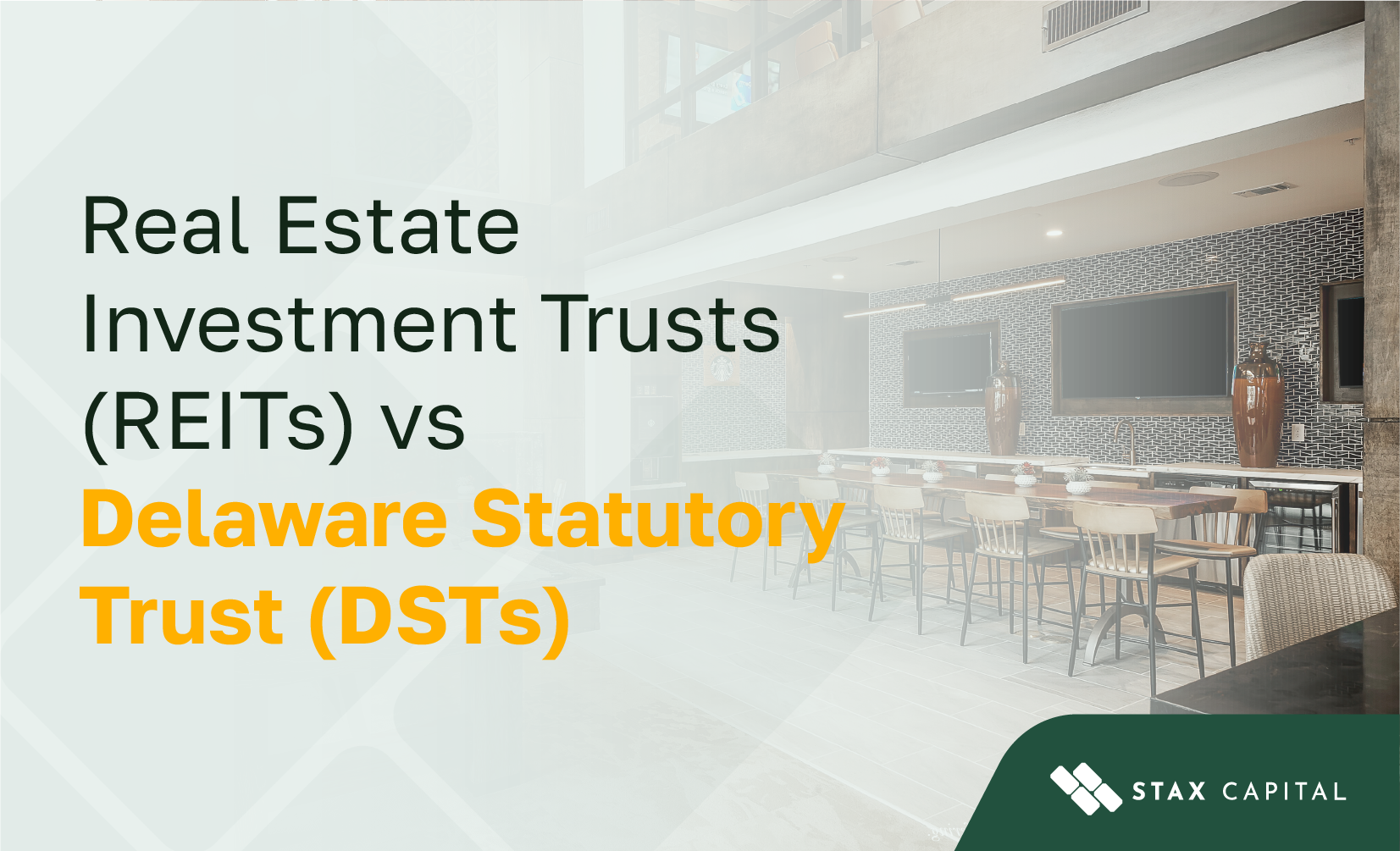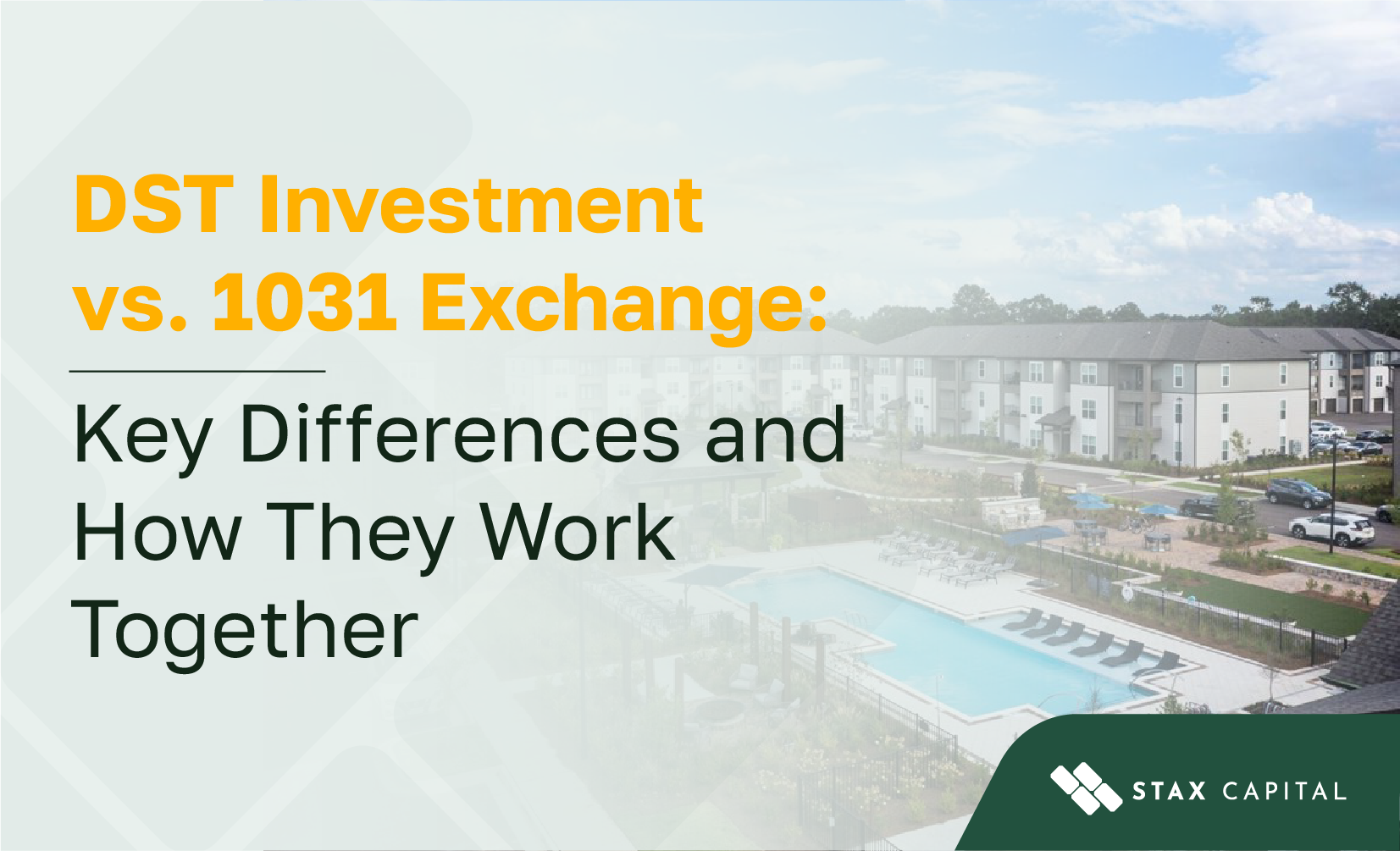How to Become a Passive Real Estate Owner Through DSTs

Exchange Tips
Are you interested in real estate but don’t want the hassle of managing properties?
A Delaware Statutory Trust (DST) might be the perfect solution for you. DSTs offer a passive real estate investing approach to building wealth through large-scale property investments, leaving the tough work to the professionals.
In this post, we’ll dive deep into what a DST is, how DSTs work, and why they’re a smart choice for passive real estate investors.
What is a DST?
A Delaware Statutory Trust (DST) is a legal entity created under Delaware law that allows investors to own fractional interests in large commercial real estate assets. DST investors are typically passive, meaning they don't manage the properties themselves. The trust is managed by professional sponsors who handle all aspects of property management
One key benefit of DSTs is the opportunity for diversification. This reduces your risk because your money is spread across different properties. However, while DSTs offer a passive route to real estate investment, they come with risks like limited liquidity and dependence on the sponsor’s performance.
Typical DST investments include multifamily apartments, industrial buildings, and Self Storage facilities. This diversification allows investors to invest in different real estate sectors while enjoying the perks of passive income without the hassles of property management.
Benefits of Passive Ownership with DSTs
Hands-Off Property Ownership: When you invest in a DST, you enjoy the benefit of a hands-off approach to property ownership. No late-night calls about leaky faucets or finding new tenants—everything is managed by professionals. However, investors should be aware that they have no control over property decisions, as all management responsibilities lie with the sponsor.
Diversification Through Multiple Properties: DSTs enable you to diversify your investments easily. Rather than investing heavily in just one property, you can spread your investment across multiple assets, minimizing your risk exposure.
Tax Benefits and 1031 Exchange Opportunities: DSTs offer significant tax benefits. If you sell a property, a 1031 exchange lets you reinvest your profits into a DST without immediate tax consequences. However, it is essential to consult a qualified tax advisor to understand the tax benefits of DSTs and the risks associated with DST investments.
Potential for Passive Income Streams: With DSTs, you can enjoy the potential for passive income through rent. A DST may generate passive income without you handling daily property management. Yet, income isn’t guaranteed; market shifts can bring lower returns or even temporary losses.
Note: DSTs also carry risks, including limited liquidity, fluctuating market value, and a lack of direct control. Past performance is not indicative of future results. Investors should consult with their tax, legal, and financial advisors to assess whether DST investments are suitable for their individual situation.
Who Can Benefit from DST Investments?
Individuals Looking for Retirement Income: If you're nearing retirement and desire passive income, DSTs can be a great option. They provide potential rental income without the hassle of managing properties. With cash flow from rent, you can spend retirement doing what you love—be it travel, family time, or exploring hobbies.
Accredited Investors: For accredited investors, DSTs can be an ideal option. They allow you to invest in quality real estate without the hassle of hands-on management. Experienced managers handle everything, from tenant issues to maintenance. This lets you expand your investment portfolio without sacrificing time for work or leisure. However, be aware that DSTs are long-term commitments and may come with potential risks.
Individuals Transitioning from Active Real Estate Ownership: If you have been actively managing real estate and want to move to a more passive role, DSTs can help. They allow you to stay invested in the real estate market while eliminating the headaches of daily management. This can be particularly appealing if you want to enjoy the benefits of real estate investing without the stress of constant oversight.
How to Get Started with DSTs
Step 1: Educate Yourself
The first step is understanding what a DST is and how DSTs work. Look into how they are structured, what types of properties are available, and the benefits of DST investments, such as passive income and tax advantages. Read books and articles, and seek out professionals who specialize in DSTs to gain insights. It’s important to have a solid foundation before diving into an investment.
Step 2: Set Your Investment Goals
Before investing, it’s important to define what you’re hoping to achieve. Are you seeking passive income, or are you more interested in using the tax-deferral benefits of a 1031 exchange? Defining your financial goals will help you focus on the right DST opportunities and avoid unnecessary risks.
Step 3: Engage a Qualified Intermediary (QI)
In the world of DST investments, a QI plays an essential role. They help manage the transactions and ensure all legal and tax-related requirements are met. It is important to work with a trusted QI to help manage your exchange process and ensure compliance with tax regulations. Knowing how to invest in DSTs often begins with securing a qualified intermediary who can guide you through the complexities of the process.
Step 4: Identify Suitable DST Properties
Now that you've set your goals and have the help of a QI, it's time to identify DST properties that match your investment goals. Consider factors like the property's location, its type (commercial or residential), and the track record of the property sponsor. Ensure you understand the potential performance and risks of the property before you proceed. This step is vital for anyone learning how to invest in DSTs. Remember, selecting the right properties can greatly affect your investment success.
Step 5: Conduct Due Diligence
Before committing to any investment, conduct a thorough review of the financial documents and property reports. This due diligence ensures that the DST property is sound and aligns with your financial objectives. Consulting your financial advisor can provide an extra layer of assurance during this process.
Step 6: Invest and Monitor Your Portfolio
Once everything checks out, proceed with your investment. Even though DSTs are meant for passive ownership, it’s important to monitor how your investments are doing. Keeping up with your portfolio and market trends helps ensure you reach your financial goals. This way, you can adjust your strategy if necessary.
The Importance of Working with Qualified DST Professionals
Investing in a Delaware Statutory Trust (DST) has many benefits. You can enjoy tax deferral, potential income, and diversification for your portfolio. However, DST transactions can be complex. To navigate these challenges, it’s essential to work with qualified DST professionals. They guide you through the investment process. They ensure you comply with IRS regulations and help identify any potential risks in your transactions.
Here's why it's crucial:
- Complex IRS Guidelines: DSTs are governed by strict IRS rules, especially within the framework of 1031 exchanges. A qualified professional ensures compliance with these regulations to help you avoid disqualification.
- Tax Strategy Optimization: DST professionals help you maximize the tax benefits of DSTs. They structure your transactions correctly and ensure proper reinvestment. This helps reduce potential tax liabilities.
- Thorough Due Diligence: DST professionals conduct detailed market analysis and property evaluations. This ensures you find investments that fit your financial goals and risk tolerance.
- Understanding Market Conditions: DST experts stay updated on real estate trends and performance indicators. They ensure you invest in properties that have the best potential for passive income.
- Replacement Property Identification: Timing is critical in 1031 exchanges. Qualified DST professionals help you identify replacement properties within the 45-day IRS window.
- Managing the Exchange Process: From sale to acquisition, DST professionals simplify the exchange process. They handle all documentation to meet deadlines properly.
- Managing Transaction Risks: Professionals provide an in-depth understanding of DST limitations, market risks, and property performance. This helps you make informed decisions about your investments.
- Minimizing Investment Errors: Qualified professionals reduce the chance of mistakes. This safeguards your investment from disqualification or penalties.
Why Choose Stax?
At Stax, our team of professionals has over 35 years of experience in providing DST investment guidance and 1031 exchanges. We focus on providing thorough due diligence, comprehensive support, and a client-first approach. Here’s how we can help:
- Personalized Guidance: We provide tailored advice, ensuring your investment strategy aligns with your financial goals.
- Thorough Due Diligence: Our professionals conduct in-depth market and property analysis to select investments that meet your criteria for risk and return.
- Comprehensive Support: From managing compliance to handling every detail of the exchange process, Stax supports you at every stage to ensure a seamless and successful transaction.
Understanding Minimum Investment Requirements and Risks in DSTs
Investing in a Delaware Statutory Trust (DST) offers unique opportunities. However, you should be aware of minimum investment levels and possible risks:
- Minimum Investment Requirements: DSTs typically require a minimum investment of around $100,000. Also, they are usually available only to accredited investors who meet certain income or net worth criteria. These limits ensure that investors are committed to long-term strategies and can benefit from fractional ownership in high-quality properties.
- Illiquidity Risk: DSTs are long-term investments, and there is no secondary market for trading. Investors should be prepared to hold their investment for 5-10 years or more, as early liquidation is usually not an option. Understanding these illiquidity factors is crucial for minimizing risk with DSTs.
- Market Sensitivity: Real estate investments, including DSTs, are subject to economic factors such as inflation, interest rates, and market fluctuations. These factors may impact property value and income potential.
By understanding these requirements and risks, you can make informed decisions about whether a DST investment aligns with your financial goals.
Ready to start your Journey Toward Passive Real Estate Investing?
DSTs may offer opportunities for passive income and long-term capital appreciation. However, it’s essential to understand both the benefits and risks associated with investing in DSTs.
It is also crucial to work with qualified professionals to make the most of your investment. With Stax, you get expert guidance every step of the way, ensuring your DST investments align with your financial goals.
Ready to explore your DST options? Contact Stax today to get started.



Share: